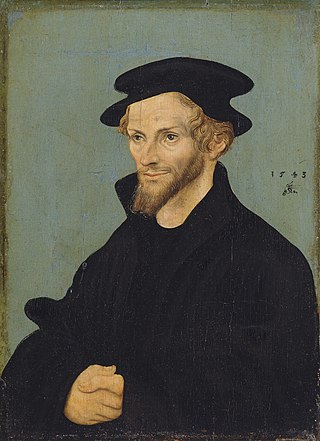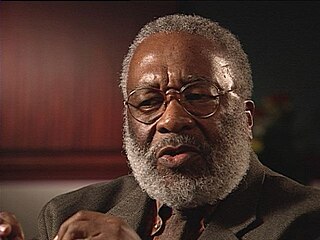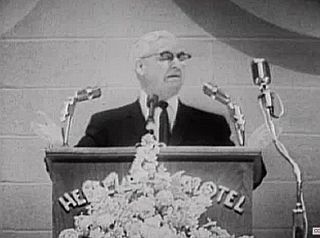James David Bales | |
|---|---|
| Born | 5 November 1915 |
| Died | 16 August 1995 (aged 79) |
| Nationality | American |
| Education | Harding University, Peabody College, University of California at Berkeley |
| Occupation | Bible Professor |
| Years active | 1944-1980 |
| Notable work | The Martin Luther King Story: A Study in Apostasy, Agitation, and Anarchy |
| Spouse | Mary |
| Children | 6 |
James David Bales (November 5, 1915 - August 16, 1995 [1] ) was an influential Bible professor, controversialist and administrator at Harding University (then Harding College) for almost forty years.
He was born in Tacoma, Washington, but soon moved to Albany, Georgia. He was eleven when his parents were both killed by a train. He then lived with his grandparents in Fitzgerald, Georgia and attended the Woodward Academy, where he was a wrestler. In 1932, he went to Georgia Tech High School, graduating in 1933. He received his bachelor of arts degree at Harding College, where he was also a state wrestling champion in 1936, and received a master's degree at George Peabody college, followed by a doctorate in theological studies at the University of California at Berkley. [2]
He was widely known for his conservative viewpoints, both in religious matters and in politics through his work with the college's American Studies Institute and an adjacent institute, the National Education Program. Working closely with the founder of the National Education Program (NEP), Harding President and nationally known conservative activist George S. Benson, Bales played a leading role in establishing Harding, through the work of the National Education Program and School of American Studies, as a nationally known center for conservative activism. He published, among other works, The Martin Luther King Story: a Study in Apostasy, Agitation, and Anarchy, which attacks King as a radical and a communist. [3]
One of Bales' opponents, Don Haymes, concisely summarized a widespread view of Bales in a 1977 essay (which represented the views of a faction within the Churches of Christ opposed to the strong political and theological conservatism represented by Bales, Benson, and the School of American Studies):
In the beginning, 30 or more years ago, he was Young Lochinvar riding out of the West, a newly minted Doctor of Philosophy from Berkeley, boldly slaying the dragons of Error and rescuing the distressed damsels of Truth. If today he seems more like Don Quixote, loping along on a flea-bitten nag, helmet slightly askew, armed with a pen rather than a lance, befuddled by the alchemy of the printed word—it is perhaps only our perceptions which changed; where once we saw dragons and giants, the cold light of time reveals only windmills, and the fair damsels are seen to be homely harridans hawking their ware. …….. As an author, Dr. Bales assumes legendary proportions. The Harding Graduate School Library lists 64 separate titles from The Christian Conscientious Objector (1944) to Psalm for Frightened and Frustrated Sheep (1976). He has published most of this remarkable output himself, or with the imprint of obscure purveyors of tracts and Bible school literature; but Baker Book House has issued three volumes and Christian Standard has published another; several, including his most notorious work, The Martin Luther King Story, were put out by Billy James Hargis' Christian Crusade. Beyond the books are countless articles on every item from religious controversy from the Pope to the Pentecostals. Through several serious illnesses and the siring of a trainload of talented and attractive progeny, James Bales has managed to propel himself into the eye of almost every storm confronting the Church of Christ for more than three decades. [4]
Bales is tightly linked to George S. Benson and the National Education Program (NEP) at Harding. Much of his work and advocating for Benson and the NEP, as discussed in Sometimes in the Wrong But Never in Doubt. [5] The influence of the NEP long colored perceptions of Bales and Harding College. A controversy involving Bales' influence at Harding, a dispute between Bales and a Harding Professor named James Atteberry, [6] is also covered in Hicks' book. [[ citation needed ]] Ostensibly a dispute over the theological soundness of a private paper delivered by Atteberry at a Harding faculty meeting, the dispute seemed to involve dissenting faculty and student opinions regarding the overall zeitgeist of the NEP and political, cultural, and religious conservatism at Harding in general.
In addition, his stance in favor of racial segregation garnered criticism. In 1957, 85% of the Harding students and over 100 faculty members signed a paper stating that they would accept integration at Harding. To stop this, Benson enlisted Bales to ameliorate their concerns. Benson and Bales were racists who were against racial integration. Bales argued that segregation should be viewed as a local tradition that should be respected. He stated his belief that God accepted all people, no matter their station in life. However, in the New Testament, the church did not dismantle social hierarchies, and acts that were offensive to some church members (such as the eating of meat sacrificed to idols) were avoided so as not to offend them. Bales argued that racial desegregation should be viewed the same way: as an offensive practice to be avoided. [7] Bales' racist views slowly changed, and Harding College was eventually integrated, despite his argument for putting off such changes until some time in the distant future. [7]
A consensus about Bales' overall legacy remains unclear, but it appears there has been a rapid decline of Bales legacy and presence upon his retirement and death, as suggested by Haymes' conclusion that "His influence in the Harding sphere ran broad and deep, but it has not, I think, run long." [[ citation needed ]]
{{cite book}}: |work= ignored (help)
Arminianism is a movement of Protestantism initiated in the early 17th century, based on the theological ideas of the Dutch Reformed theologian Jacobus Arminius and his historic supporters known as Remonstrants. Dutch Arminianism was originally articulated in the Remonstrance (1610), a theological statement submitted to the States General of the Netherlands. This expressed an attempt to moderate the doctrines of Calvinism related to its interpretation of predestination.

Mormonism is the theology and religious tradition of the Latter Day Saint movement of Restorationist Christianity started by Joseph Smith in Western New York in the 1820s and 1830s. As a label, Mormonism has been applied to various aspects of the Latter Day Saint movement, although there has been a recent push from the Church of Jesus Christ of Latter-day Saints to distance themselves from this label. A historian, Sydney E. Ahlstrom, wrote in 1982 that, depending on the context, the term Mormonism could refer to “a sect, a mystery cult, a new religion, a church, a people, a nation, or an American subculture; indeed, at different times and places it is all of these."

Philip Melanchthon was a German Lutheran reformer, collaborator with Martin Luther, the first systematic theologian of the Protestant Reformation, an intellectual leader of the Lutheran Reformation, and influential designer of educational systems.
Justificatio sola fide, meaning justification by faith alone, is a soteriological doctrine in Christian theology commonly held to distinguish the Lutheran and Reformed traditions of Protestantism, among others, from the Catholic, Eastern Orthodox, Oriental Orthodox, Assyrian and Anabaptist churches. The doctrine asserts that it is on the basis of faith alone that believers are made right of sin ; and not on the basis of what Paul the Apostle calls "works of the law", which sola fide proponents interpret as including not only moral, legal or ceremonial requirements but any good works or "works of charity."

The Great Apostasy is a concept within Christianity to describe a perception that mainstream Christian Churches have fallen away from the original faith founded by Jesus and promulgated through his Twelve Apostles.
In Mormonism, the restoration refers to a return of the authentic priesthood power, spiritual gifts, ordinances, living prophets and revelation of the primitive Church of Christ after a long period of apostasy. While in some contexts the term may also refer to the early history of Mormonism, in other contexts the term is used in a way to include the time that has elapsed from the church's earliest beginnings until the present day. Especially in the Church of Jesus Christ of Latter-day Saints "the restoration" is often used also as a term to encompass the corpus of religious messages from its general leaders down to the present.
Restorationism, also known as Restitutionism or Christian primitivism, is a religious perspective according to which the early beliefs and practices of the followers of Jesus were lost or adulterated after his death and required "restoration". It is a view that often "seeks to correct faults or deficiencies by appealing to the primitive church as normative model".
In Christian eschatology, postmillennialism, or postmillenarianism, is an interpretation of chapter 20 of the Book of Revelation which sees Christ's second coming as occurring after the "Millennium", a Golden Age in which Christian ethics prosper. The term subsumes several similar views of the end times, and it stands in contrast to premillennialism and, to a lesser extent, amillennialism.

In Christian theology, justification is the event or process by which sinners are made or declared to be righteous in the sight of God.
Harding University is a private university with its main campus in Searcy, Arkansas. It is the largest private university in Arkansas. Established in 1924, the institution offers undergraduate, graduate, and pre-professional programs. The university also includes the Harding School of Theology, located in Memphis, Tennessee, which was formerly known as Harding Graduate School of Religion. Harding is one of several institutions of higher learning associated with the Churches of Christ.
The two kingdoms doctrine is a Protestant Christian doctrine that teaches that God is the ruler of the whole world and that he rules in two ways. The doctrine is held by Lutherans and represents the view of some Calvinists. John Calvin significantly modified Martin Luther's original two kingdoms doctrine, and certain neo-Calvinists have adopted a different view known as transformationalism.
The conditional preservation of the saints, or conditional perseverance of the saints, or commonly conditional security, is the Arminian Christian belief that believers are kept safe by God in their saving relationship with him upon the condition of a persevering faith in Christ. Arminians find the Scriptures describing both the initial act of faith in Christ, "whereby the relationship is effected", and the persevering faith in him "whereby the relationship is sustained." The relationship of "the believer to Christ is never a static relationship existing as the irrevocable consequence of a past decision, act, or experience." Rather, it is a living union "proceeding upon a living faith in a living Savior." This living union is captured in the simple command by Christ, "Remain in me, and I in you".

The history of the Calvinist–Arminian debate begins in early 17th century in the Netherlands with a Christian theological dispute between the followers of John Calvin and Jacobus Arminius, and continues today among some Protestants, particularly evangelicals. The debate centers around soteriology, or the study of salvation, and includes disputes about total depravity, predestination, and atonement. While the debate was given its Calvinist–Arminian form in the 17th century, issues central to the debate have been discussed in Christianity in some form since Augustine of Hippo's disputes with the Pelagians in the 5th century.

Apostasy in Christianity is the repudiation of Christ and the central teachings of Christianity by someone who formerly was a Christian (Christ-follower). The term apostasy comes from the Greek word apostasia meaning "rebellion", "state of apostasy", "abandonment", or "defection". It has been described as "a willful falling away from, or rebellion against, Christianity. Apostasy is the rejection of Christ by one who has been a Christian. …" "Apostasy is a theological category describing those who have voluntarily and consciously abandoned their faith in the God of the covenant, who manifests himself most completely in Jesus Christ." "Apostasy is the antonym of conversion; it is deconversion."

Roy A. Cheville was a religious leader, theologian and educator in the Reorganized Church of Jesus Christ of Latter Day Saints, which became Community of Christ in 2001. Cheville graduated from Graceland University in 1921 with an Associate of Arts (A.A.) degree in liberal arts and religious education. In 1926, he authored Graceland's Alma Mater Hymn while on the faculty. He obtained his Ph. B. in 1922, an A.M in Divinity in 1923, a D.B. in Practical Theology in 1925, and later a Ph.D. in religion in 1942, all from the University of Chicago. He was the first member of his denomination to complete a doctoral level religious education.
The doctrine of the Trinity, considered the core of Christian theology by Trinitarians, is the result of continuous exploration by the church of the biblical data, thrashed out in debate and treatises, eventually formulated at the First Council of Nicaea in AD 325 in a way they believe is consistent with the biblical witness, and further refined in later councils and writings. The most widely recognized Biblical foundations for the doctrine's formulation are in the Gospel of John, which possess ideas reflected in Platonism and Greek philosophy.

Vincent Gordon Harding was an African-American pastor, historian, and scholar of various topics with a focus on American religion and society. A social activist, he was perhaps best known for his work with and writings about Martin Luther King Jr., whom Harding knew personally. Besides having authored numerous books such as There Is A River, Hope and History, and Martin Luther King: The Inconvenient Hero, he served as co-chairperson of the social unity group Veterans of Hope Project and as Professor of Religion and Social Transformation at Iliff School of Theology in Denver, Colorado. When Harding died on May 19, 2014, his daughter, Rachel Elizabeth Harding, publicly eulogized him on the Veterans of Hope Project website.

George Stuart Benson was an American missionary, college administrator, and conservative political activist. After fleeing communist uprisings in China as a missionary, Benson became an anticommunist and conservative activist, taking stances against the New Deal, and later, racial integration. Benson served for many years as the president of Harding College, and oversaw a large propaganda network through his National Education Program, which sponsored short cartoons, "Freedom Forums", and lecture tours for Benson.
Martin Luther (1483–1546) was a German professor of theology, priest and seminal leader of the Reformation. His positions on Judaism continue to be controversial. These changed dramatically from his early career, where he showed concern for the plight of European Jews, to his later years, when embittered by his failure to convert them to Christianity, he became outspokenly antisemitic in his statements and writings.

Clifton L. Ganus Jr. was an American theologian and educator. He served as the third president of Harding College in Searcy, Arkansas from 1965 to 1987. He was closely associated with National Education Program, a conservative organization within the university that was later known as the American Studies Program. The involvement of Ganus and President Benson was with this group continued until 1954, when they disassociated with the group in order for the school to gain accreditation. He previously was a professor of history, chair of the department of history and social science, and vice president of the college. Ganus died in Searcy, Arkansas in September 2019 at the age of 97.